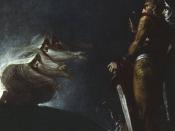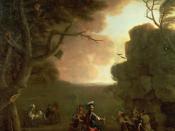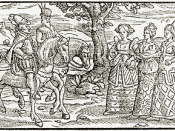Macbeth's Character seems to change throughout the play. Macbeth was first presented in the play as a brave, warrior hero who won the heart and recognition from the king because of his reputation on the battlefield. The way people saw him was about to change. His bravery cam together with aspiration, feeling that being king would bring happiness to him, when at the same time it creates an intrinsic disturbance. Lady Macbeth seems to give Macbeth the character of a man not destitute of the feelings of humanity. ÃÂMacbeth strongly inculcates power of prediction, even in the worst and most contemptible agents; inculcates a supernatural influence of one mortal being over anotherÃÂ(Shakespearean Criticism Vol. 3, 176).
The prophecies of the three Witches worries Macbeth making him confused. The Witches could have been just a figment of his imagination, or conscience. Duncan then announces that the kingdom was going to be designated to Malcolm, making Macbeth baffled.
This gave Macbeth ambition to commit the murder. Lady Macbeth instigated things knowing Macbeth might act on his feelings and he proceeded in the murder. Even though Macbeth may be diabolical, his conscience gets the best of him when he is about to commit the murder. He seems to be in a moral conflict with himself. He questions his own actions and what he has done, making a diabolical man almost empathetic, human. Nonetheless, this conflict doesnÃÂt last long as he schmoozeÃÂs his next victim, Banquo. All the anxiety he has leads to the murder of Banquo. It wasnÃÂt hate that he had for Banquo, it was admiration.
ÃÂÃÂ to be thus, is nothing;But to be safely thus; --our fears in BanquoStick deep; and in his royalty of natureReigns that which would be fearÃÂdÃÂ ÃÂ(III. I. 47-50)However, instead of killing Banquo himself, he hires murderers to do the dirty work. He is not "man" enough to do it himself... also, if someone else does the killings, Macbeth is morally spared.
Macbeth plans many murders so he can become king and obtain what he thinks is his throne. He has times of horrendous guilt after BanquoaÃÂs ghost came about. Death starts not bothering Macbeth and it no longer scares him to do it. He basically starts doing it for convenience. ÃÂFirst he murdered in accordance with what he believed the witches had instructed. Later he tried to subvert the predictions of the witches by murdering Banquo, a plot completed with a minimum of regret. And Macbeth resolves to commit this last killing with no compunction whatsoeverÃÂ(Shakespeare the Playwright, 201).
After many murders Macbeth figured out that he had been cut off from all humanity. He struggles to grasp the throne, even after all he has done. War was about to begin for Macbeth. ÃÂHe knows that whatever he tries, he is already damnedÃÂ(Shakespeare the Playwright, 207). A battle between Macbeth and Malcolm is under way. Macbeth had contemplated suicide but decided to go against that and die by fighting. Macbeth at one point was called a coward by Malcolm because he tried to run. In the end, he did not come out on top with the throne in his hands. He lost the battle because of all of his bad decisions.
The variations of MacbethÃÂs character demonstrate the emotional stress inside him. His moral sense wouldnÃÂt permit for him to discontinue the murder spree on his way to the top but he couldnÃÂt look at himself as a murderer either. With every murder that Macbeth committed, he invited destiny and chance.
Works CitedCahn, Victor L. Shakespeare the Playwright. New York: Greenwood Press, 1991. 179-208.
Coursen, H R. Macbeth: a Guide to the Play. Westport, Connecticut: Greenwood Press,1997.
McCracken, Ellen. Shakespearean Criticism. Ed. Laurie Lanzen Harris and Mark W.
Scott. Vol. 3. Detroit: Gale, 1986. 176-182, 306-309.
McCracken, Ellen. Shakespearean Criticism. Ed. Joseph C. Tardiff. Vol. 20. Detroit:Gale, 1993. 20McCracken, Ellen. Shakespearean Criticism. Ed. Michelle Lee. Vol. 44. Detroit: Gale,1999. 324-325.
Nostbakken, Faith. Understanding Macbeth: A Student Casebook to Issues, Sources, andHistorical Documents. Westport, Connecticut: Greenwood Press, 1997.
Shakespeare, William. William Shakespeare Macbeth Texts and Contexts. Ed. WilliamC. Carroll. Boston: Bedford/St. Martin's, 1999. 21-111.





